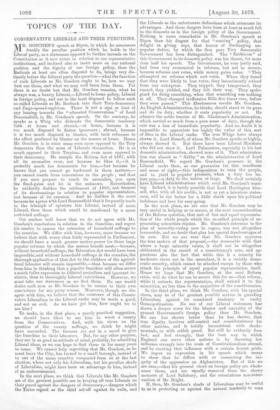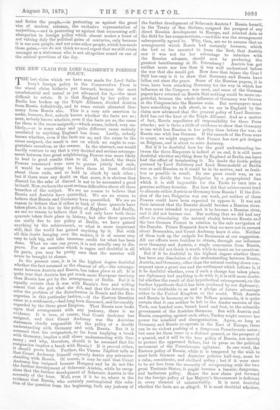TOPICS OF THE DAY.
CONSERVATIVE LIBERALS AND THEIR FUNCTIONS.
jR. GOSCHEN'S speech at Ripon, in which he announces .111 frankly the peculiar position which he holds in the Liberal party, as a statesman opposed to further inroads on the Constitution as it now exists in relation to our representative institutions, and inclined also to insist more on our national position and the dignity of our foreign policy, than the Radicals at least are often disposed to do, brings very dis- tinctly before the Liberal party the question—what the function of such Liberals as Mr. Goschen ought to be, how we may best use them, and what we may well learn from them. For there is no doubt but that Mr. Goschen remains, what he always was, a hearty Liberal,—Liberal in home policy, Liberal in foreign policy, and not in the least disposed to follow such so-called Liberals as Mr. Roebuck into their Tory-democracy and Jingo-spread-eagleism. There is not a sign or hint of any leaning towards the "educated Conservatism" of Lord Beaconsfield, in Mr. Goschen's speech. On the contrary, he speaks as a Whig who distrusts the democratic tendency both at home and .abroad,—at home, because it is too much disposed to flatter ignorance ; abroad, because it is too much disposed to bluster, with tacit reference to the effect produced by bluster on the masses at home. Hence Mr. Goschen is in some sense even more opposed to the Tory democrats than the mass of Liberals themselves. He is as much opposed to their Toryism, and even more opposed to their democracy. He accepts the Reform Act of 1867, with all its anomalies even, not because he likes it,—it is probably much too democratic for him,—but because he knows that you cannot go backward in these matters,— you cannot recede from concessions to the people ; and that if you once propose to touch its anomalies, you open the flood-gates and let in the unknown. Nevertheless, he evidently dislikes the settlement of 1867, not because of its shortcomings in relation to popular representation, but because of its excesses. And he dislikes it the more because he agrees with Lord Beaconsfield that it frequently tends to the triumph of opinions less Liberal, instead of more Liberal, than those which would be sanctioned by a more restricted suffrage.
Our readers well know that we do not agree with Mr. Goschen's conclusions in relation to the franchise, and regret his resolve to oppose the extension of household suffrage to the counties. We differ with him, however, more because we believe that with every class fairly represented in Parliament, we should have a much greater motive-power for those large popular reforms by which the masses benefit most,—because, without household suffrage, the Education Act would have been impossible, and without household suffrage in the counties, the thorough application of that Act to the children of the agricul- tural labourer will remain impossible,—than because we differ from him in thinking that a popular franchise will often secure a much fuller expression to illiberal prejudices and ignorant in- stincts, than to thoroughly Liberal convictions. However, we must take our statesmen as we find them. No one would desire such men as Mr. Goschen to be untrue to their own convictions for any party reason. Moreover, though we dis- agree with him, we believe that the existence of this Conser- vative Liberalism in the Liberal ranks may be made a good, and not an evil. As we have got him, how ought we to use him?
To make, in the first place, a purely practical suggestion, we should have liked to use him to wrest a county from the Conservatives. And, with his views on the question of the county suffrage, we think he might have succeeded. The farmers are not in a mood to give the franchise to their labourers. But, for any other purpose, they are in as good an attitude of mind, probably, for admitting Liberal ideas, as we can hope to find them in for many years to come. We cannot help regretting that Mr. Gosohen, as he must leave the City, has turned to a small borough, instead of to one of the many counties conquered from us at the last election, where not only his Liberalism, but his peculiar shade of Liberalism, might have been an advantage to him, instead of an embarrassment.
In the next place, we think that Liberals like Mr. Goschen are of the greatest possible use in keeping all true Liberals on their guard against the dangers of democracy,—dangers which the Tories regard as the chief set-off against its evils, and the Liberals as the unfortunate deductions which attenuate its advantages. And these dangers have been at least as much felt in the domestic as in the foreign policy of the Government. Nothing is more remarkable in Mr. Goschen's speech at Ripon than his disgust for that " coaxing " policy, that delight in giving sops, that horror of discharging un- popular duties, by which the first pure Tory democratic Government has been distinguished. The "flabbiness" of this Government in its domestic policy was his theme, for more than half his speech. The Government, he very justly said, had been very economical in reforms, but not in money, because reforms cost votes, while money gains votes. "They attempted no reforms which cost votes. When they found that they were likely to lose votes, they incontinently retired from any enterprise. They tripped, they temporised, they coaxed, they yielded, and they felt their way. They apolo- gised for doing something, when that something was nothing at all. They changed inoffensive Bills five times over, before they were passed." This fibrelessness revolts Mr. Goschen. An English Administration, he thinks, should stand to its guns and do its duty, whether it costs popularity or not. He admires the noble tension of Mr. Gladstone's Administration, which carried so much from a pure sense of duty, though the cost was a loss of immediate popularity. And no doubt it is impossible to appreciate too highly the value of this sort of fibre in the Liberal ranks. The true Whigs have always shown it. Lord Russell, of whom Mr. Goschen speaks so highly, always showed it. But there have been Liberal Ministers who did not show it. Lord Palmerston, especially in his last domestic administration, showed none of it. That administra- tion was almost as " flabby " as the administration of Lord Beaconsfield. We regard Mr. Goschen's presence in the Liberal ranks then, as one guarantee for this manliness and sense of right,—this indisposition to coax the people, and to yield to popular pressure, when a duty lies be- fore you,—a duty to the nation at large. We shall certainly have Liberal administrations which need Mr. Goschen's warn- ing. Indeed, it is barely possible that Lord Hartington him- self, who, with all his mettle, is not as yet a laborious states- men, will be the better for a little cheek upon his politica/ indolence and love for easy-going. In the next place, we are sure that Mr. Goschen may be very useful in helping us to secure, at the next reconsideration of the Reform question, that sort of fair and equal representa- tion of the whole people which the so-called principle of re- presenting minorities enjoins. Mr. Goschen's reference to the plan of minority-voting now in vogue, was not altogether favourable, and no doubt that plan has special disadvantages of its own. But we are sure that Mr. Goschen approves the true motive of that proposal,—the reasonable wish that where a large minority exists, it shall not be altogether obliterated in the record of a constituency's vote, and ap- preciates also the fact that while this is a security for moderate views not in the ascendant, it is a strictly demo- cratic security, which cannot be attacked except by those who attack the principle of equal popular representation itself. Hence we hope that Mr. Goschen, at the next Reform crisis, will do what he can to secure this for us—that reform, while it extends the representation, shall extend it to the minorities, no less than to the majorities of the constituencies.
In the third place, we think Mr. Goschen, with his special views, may be of the greatest possible service in guarding Liberalism against its occasional tendency to washy Cosmopolitanism. No one of our Liberal statesmen has shown a deeper scorn for the bluster and unreality of the present Government's foreign policy than Mr. Goschen. No one has shown better than he has shown, that true dignity involves self-control and considerateness for other nations, and is totally inconsistent with rhodo- montade, or with selfish greed. But still he evidently does feel, and feel strongly, that the best way in which England can serve other nations is by throwing her influence strongly into the scale of Constitutionalism abroad, and by exerting that influence with a certain honest pride. We regret an expression in his speech which seems to show that he differs with us concerning the ini- quity of the aggression on Afghanistan. But of this we are sure,—that his general views on foreign policy are whole- some views, and are equally removed from the showy menaces of Lord Salisbury, and the ostentatious non-inter- vention of Mr. Bright. If, then, Mr. Goschen's shade of Liberalism may be useful to us in protecting us against the natural tendency to coax
and flatter the people,—in protecting us against the great vice of modern reforms, the exclusive representation of majorities,—and in protecting us against that unmeaning self- abnegation in foreign policy which almost makes a boast of not valuing duly the political gains of centuries, only because it is our own people, and not some other people, which has made these gains,—we do not think we need regret that we still retain amongst us a statesman who is not altogether sound on one of the critical questions of the day.































 Previous page
Previous page